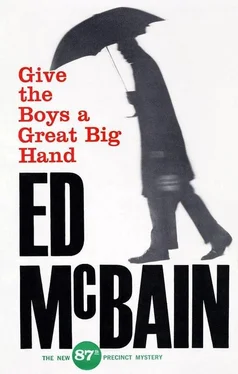“Yes.”
“The next morning, the thirteenth, I called the police.” Tudor paused. He looked past the detectives and through the window where the rain dripped steadily against the red brick of the Creo Building. “I had bought her a necklace for Valentine’s Day. I was going to give it to her on Valentine’s Day.” He shook his head. “And now she’s gone.”
“What kind of a necklace, Mr. Tudor?”
“A ruby necklace. She has black hair, you know, very black, and deep brown eyes. I thought rubies, I thought the fire of rubies... ” He paused again. “But she’s gone, isn’t she?”
“Who owns The King and Queen, Mr. Tudor?”
“A man named Randy Simms. Randolph is his full name, I believe, but everyone calls him Randy. He runs a very clean establishment. Do you plan to call on him?”
“Yes. Maybe he can give us some help.”
“Find her, would you?” Tudor said. “Oh, God, please find her.”
The King and Queen was actually on the outermost fringe of The Quarter, really closer to the brownstone houses that huddled in the side streets off Hall Avenue than to the restaurants, coffeehouses, small theaters, and art shops that were near Canopy Avenue.
The place was a step-down club, its entrance being one step down from the pavement. To the right of the entrance doorway was a window that had been constructed of pieces of colored glass in an attempt to simulate a stained-glass window. The colored panes showed a playing-card portrait of a king on the left, and a playing-card portrait of a queen on the right. The effect was startling, lighted from within so that it seemed as if strong sunlight were playing on the glass. The effect, too, was dignified and surprising. Surprising because one expected something more blatant of a strip joint, the life-sized placards out front featuring an Amazonian doll in the middle of a bump or a grind. There were no placards outside this club. Nor was there a bold display of typography announcing the name of the place. A small, round, gold escutcheon was set off center in the entrance door, and this was the only indication of the club’s name. The address — “12N.” — was engraved onto another round gold plaque set in the lower half of the door.
Hawes and Carella opened the door and walked in.
The club had that same slightly tired, unused look that most nightclubs had during the daytime. The look was always startling to Carella. It was as if one suddenly came across a middle-aged woman dressed in black satin and wearing diamonds at 10:00 in the morning in Schrafft’s. The King and Queen looked similarly overdressed and weary during the daylight hours, and perhaps more lonely. There wasn’t a sign of life in the place.
“Hello!” Carella called. “Anybody home?”
His voice echoed into the long room. A window at the far end admitted a single gray shaft of rain-dimmed light. Dust motes slid down the shaft of light, settled silently on the bottoms of deserted chairs stacked on round tables.
“Hello?” he called again.
“Empty,” Hawes said.
“Looks that way. Anybody here?” Carella yelled again.
“Who is it?” a voice answered. “We don’t open until six P.M.”
“Where are you?” Carella shouted to the voice.
“In the kitchen. We’re closed.”
“Come on out here a minute, will you?”
A man appeared suddenly in the gloom, wiping his hands on a dish towel. He stepped briefly into the narrow shaft of light and then walked to where the two detectives were standing.
“We’re closed,” he said.
“We’re cops,” Carella answered.
“We’re still closed. Especially to cops. If I served you, I’d get my liquor license yanked.”
“You Randy Simms?” Hawes asked.
“That’s me,” Simms said. “Why? What’d I do?”
“Nothing. Can we sit down and talk someplace?”
“Anyplace,” Simms said. “Choose your table.”
They pulled chairs off one of the tables and sat. Simms was a sandy-haired man in his late forties, wearing a white dress shirt open at the throat, the sleeves rolled up. There was a faintly bored expression on his handsome face. He looked like a man who spent his summers at St. Tropez at home among the girls in the bikinis, his winters at St. Moritz skiing without safety bindings. Carella was willing to bet he owned a Mercedes-Benz and a collection of Oriental jade.
“What’s this about?” Simms asked. “Some violation? I had the other doors put in, and I put up the occupancy signs. So what is it this time?”
“We’re not firemen,” Carella said. “We’re cops.”
“What difference does it make? Cops or firemen, whenever either of them come around, it costs me money. What is it?”
“You know a girl named Bubbles Caesar?”
“I do,” Simms said.
“She work for you?”
“She used to work for me, yes.”
“Any idea where she is?”
“Not the vaguest. Why? Did she do something?”
“She seems to have disappeared.”
“Is that a crime?”
“Not necessarily.”
“Then why do you want her?”
“We want to talk to her.”
“You’re not alone,” Simms said.
“What do you mean?”
“Only that everybody who ever walked into this joint wanted to talk to Barbara, that’s all. She’s a very attractive girl. A pain in the ass, but very attractive.”
“She gave you trouble?”
“Yes, but not in a professional sense. She always arrived on time, and she did her act when she was supposed to, and she was friendly with the customers, so there was no trouble that way.”
“Then what way was there trouble?”
“Well, there were a couple of fights in here.”
“Over Barbara?”
“Yes.”
“Who?”
“What do you mean, who?”
“Who did the fighting?”
“Oh, I don’t remember,” Simms said. “Customers. It’s a funny thing with strippers. A man watches a woman take off her clothes, and he forgets he’s in a public place and that the girl is a performer. He enters a fantasy in which he is alone with this girl, and she’s taking off her clothes only for him. Well, sometimes the fantasy persists after the lights go up. And when two guys share the same fantasy, there can be trouble. A man who thinks the girl belongs to him, is undressing for him, doesn’t like the idea of another guy sharing the same impression. Bang, the fists explode. So we heave them out on the sidewalk. Or at least we did. No more now.”
“Now you let them fight?” Hawes asked.
“No. Now we don’t give them a chance to fantasize.”
“How do you prevent that?”
“Simple. No strippers.”
“Oh? Have you changed the club’s policy?”
“Yep. No strippers, no band, no dancing. Just a high-class jazz pianist, period. Drinks, dim lights, and cool music. You bring your own broad, and you hold hands with her, not with some dame wiggling on the stage. We haven’t had a fight in the past two weeks.”
“What made you decide on this new policy, Mr. Simms?”
“Actually, Barbara had a lot to do with it. She provoked a lot of the fights. I think she did it purposely. She’d pick out two of the biggest guys in the audience, and split her act between them. First one guy, then the other. Afterwards, when she came out front, she’d play up to both of them, and bang, came the fists. Then she didn’t show up for work one night, so I was left with a string of second-run strippers and no headliner. It looked like amateur night at The King and Queen. And the trouble with the band, believe me, it wasn’t worth it.”
“What kind of trouble with the band?”
“Oh, all kinds. One of the guys on the band was a hophead, the trombone player. So I never knew whether he was going to show up for work or be found puking in some gutter. And then the drummer took off without a word, just didn’t show up one night. The drummer is a very important man in a band that accompanies strippers. So I was stuck without a headliner, and without a drummer. So you can imagine what kind of a show I had that night.”
Читать дальше





![Ричард Деминг - Whistle Past the Graveyard [= Give the Girl a Gun]](/books/412176/richard-deming-whistle-past-the-graveyard-give-t-thumb.webp)






